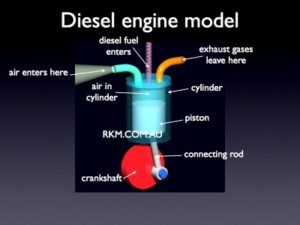
There are several differences between a diesel engine and a gas engine. A gas engine (invented by Nikolaus August Otto) runs on the Otto cycle; a method in which a vaporized mixture of gas and air is sent to the combustion chamber and is then compressed and ignited by a spark plug.
Diesels don’t have spark plugs. A diesel engine (invented by Rudolf Diesel and sometimes referred to as a “compression ignition engine”) relies on air compression and fuel. Air is compressed during the compression stroke and the fuel is injected into the cylinders under such high pressure that it heats the air in the cylinders, which ignites the fuel.
Diesel Engines, of course, run on diesel fuel. This is different from gasoline in several ways.
- Needs less refining than gas and is similar to kerosene or jet fuel
- Is heavier and oilier than gasoline
- Evaporates more slowly than gas
- Gets more miles per gallon
Once the key is turned in the ignition of a diesel vehicle it begins the process of fuel being injected into the cylinders. This heating up process can take as little as 1.5 seconds in fair weather.
A “start light” goes on within the vehicle.
Fuel pumps begin to deliver the fuel from the tank to the engine, passing through fuel filters along the way. The fuel injectors send the fuel as a spray into the combustion chambers of the cylinders. When the fuel, air and heat meet in the cylinders the fuel is ignited and the engine starts.
Because of their great fuel economy, diesel vehicles are growing in popularity in the U.S. They are less harmful to the environment and are overall an excellent choice for anyone interested in more horsepower, engine longevity, and enhanced vehicle productivity.

I have read many articals today on performace of Deisel cars, the reason i am emailing you is, i have a neighbour who has a taxi deisel and he tell me that to get the best performance he must run his car every morning for about half hour to three quarters of an hour, it just sits on the roadside outside of his house and ticks over.
Now this i think is not only bad for the enviroment but having approached him about this he says this needs to be done as it’s his livelyhood.
Can you please email me some info on why this is good for his deisel car.
Many Thanks
Lorna